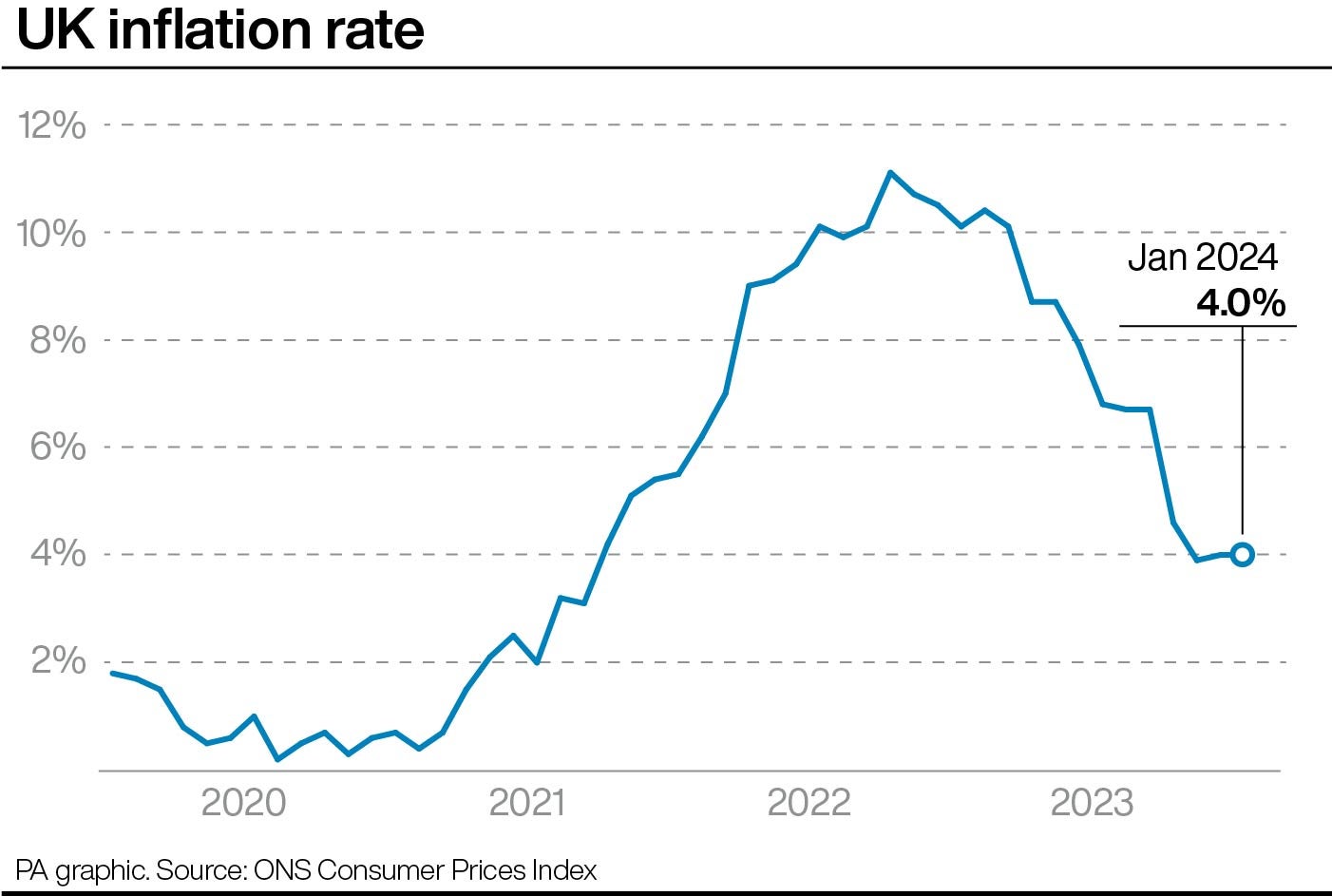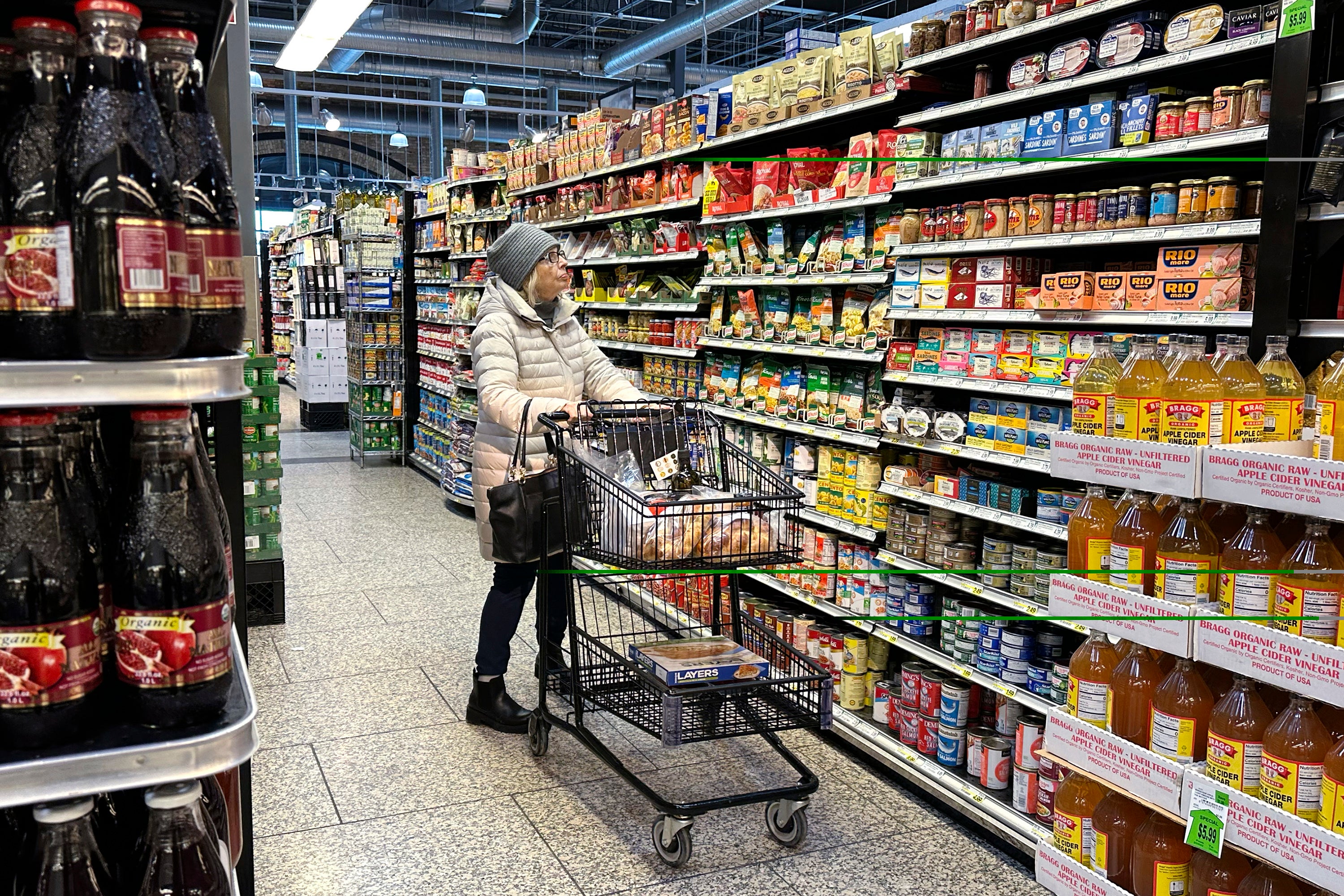Your support helps us to tell the story
From reproductive rights to climate change to Big Tech, The Independent is on the ground when the story is developing. Whether it's investigating the financials of Elon Musk's pro-Trump PAC or producing our latest documentary, 'The A Word', which shines a light on the American women fighting for reproductive rights, we know how important it is to parse out the facts from the messaging.
At such a critical moment in US history, we need reporters on the ground. Your donation allows us to keep sending journalists to speak to both sides of the story.
The Independent is trusted by Americans across the entire political spectrum. And unlike many other quality news outlets, we choose not to lock Americans out of our reporting and analysis with paywalls. We believe quality journalism should be available to everyone, paid for by those who can afford it.
Your support makes all the difference.Inflation held steady last month as food prices fell for the first time in two-and-a-half years, official figures have shown.
A slowing of inflation among many everyday food and drink items, including cheese and rice, has helped offset an acceleration in inflation for energy prices to keep the overall rate unchanged.
There have been sharp slowdowns in the average price of coffee, which rose by just 0.8% in the year to January 2024 compared with a jump of 11.9% in the year to December 2023; for sauces and herbs (up by 11.5% in January compared with 18.4% in December); frozen vegetables (up 11.5% compared with 16.2%); and mineral water (up 10.7% compared with 14.2%).
Other products have seen a more modest slowdown, including cheese (up 2.5% in the year to January, compared with 5.1% in the year to December), margarine and other vegetable fats (up 0.2% compared with 2.2%), rice (up 6.4% compared with 7.9%), and tea (up 10.6% compared with 11.3%).
However, inflation is still accelerating for a small number of groceries.

The average price of pasta and couscous was up 10.8% in the year to January compared with a rise of 6.6% in the year to December, while fruit and vegetable juices were up 12.2% compared with 10.4%, according to Consumer Prices Index (CPI) data published by the Office for National Statistics (ONS).
Two food staples have also seen inflation quicken: eggs, up 7.2% in January compared with a rise of 6.8% in December, and yoghurt, up 9.9% compared with 8.6%.
Examples of how the CPI inflation rate for food and drink items has either slowed or accelerated
Two figures are listed for each item: the average rise in price in the 12 months to December 2023, followed by the average rise in price in the 12 months to January.
– Examples where inflation has slowed:
Coffee: Dec up 11.9%, Jan up 0.8%
Olive oil: Dec 45.8%, Jan 38.2%
Sauces, condiments and culinary herbs: Dec 18.4%, Jan 11.5%
Frozen vegetables other than potatoes: Dec 16.2%, Jan 11.5%
Mineral or spring waters: Dec 14.2%, Jan 10.7%
Sugar: Dec 21.3%, Jan 18.0%
Cheese and curd: Dec 5.1%, Jan 2.5%
Potatoes: Dec 9.6%, Jan 7.1%
Fresh or chilled fish: Dec 7.2%, Jan 5.2%
Margarine and other vegetable fats: Dec 2.2%, Jan 0.2%
Edible ices and ice cream: Dec 10.8%, Jan 9.2%
Rice: Dec 7.9%, Jan 6.4%
Fresh or chilled vegetables other than potatoes: Dec 10.7%, Jan 9.4%
Pizza and quiche: Dec 5.1%, Jan 4.0%
Crisps: Dec 11.8%, Jan 10.8%
Ready-made meals: Dec 6.0%, Jan 5.2%
Tea: Dec 11.3%, Jan 10.6%
Meat: Dec 7.2%, Jan 6.6%
Fresh or chilled fruit: Dec 6.7%, Jan 6.6%
Bread: Dec 2.2%, Jan 2.1%
– Examples where inflation has accelerated:
Pasta and couscous: Dec up 6.6%, Jan up 10.8%
Cocoa and powdered chocolate: Dec 22.2%, Jan 25.1%
Fruit and vegetable juices: Dec 10.4%, Jan 12.2%
Yoghurt: Dec 8.6%, Jan 9.9%
Eggs: Dec 6.8%, Jan 7.2%
Dried vegetables: Dec 5.1%, Jan 5.4%
Preserved fruit: Dec 2.7%, Jan 3.0%
Dried fruit and nuts: Dec 10.3%, Jan 10.6%
Chocolate: Dec 9.8%, Jan 10.0%
Meanwhile, a handful of products are continuing to record negative inflation – in other words, prices are falling year on year.
The average price of whole milk was down 10.0% year on year in January, a slightly smaller fall than the drop of 11.0% in December.
Similarly the average cost of butter fell by 7.8% year on year, a smaller drop than the 8.4% decrease in December.
Low-fat milk was down 6.1% in the year to January, the same as in the year to December, while jams, marmalades and honey were down 1.1%, a slightly steeper fall than the drop of 0.9% recorded in December.

Join our commenting forum
Join thought-provoking conversations, follow other Independent readers and see their replies
Comments